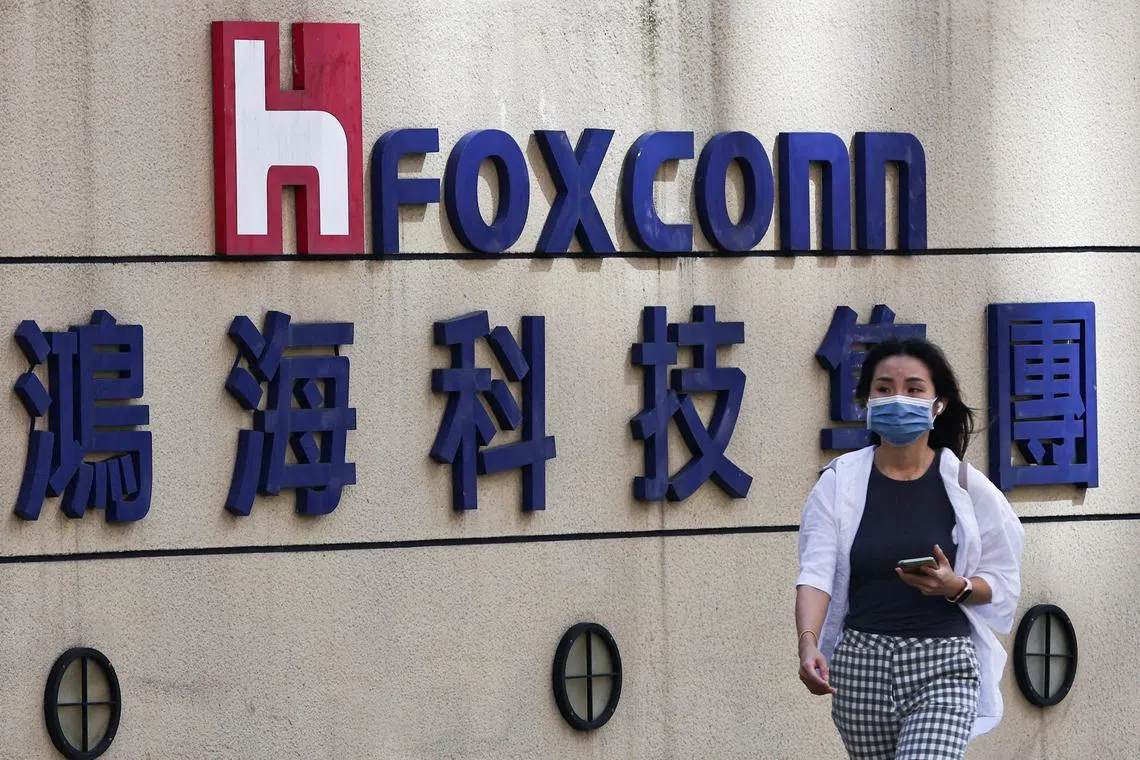Foxconn dumps $26 billion Vedanta chip plan in blow to India
Sign up now: Get ST's newsletters delivered to your inbox

Foxconn's decision to withdraw from a joint venture is a blow to Indian PM Narendra Modi's ambitions of luring foreign investors to make chips in India for the first time.
PHOTO: REUTERS
TAIPEI/BENGALURU - Foxconn has withdrawn from a US$19.5 billion (S$26 billion) semiconductor joint venture with Indian metals-to-oil conglomerate Vedanta, the Taiwanese company said on Monday, in a setback to Prime Minister Narendra Modi’s chipmaking plans for India.
The world’s largest contract electronics maker signed a pact with Vedanta in 2022 to set up semiconductor and display production plants in Mr Modi’s home state of Gujarat.
“Foxconn has determined it will not move forward on the joint venture with Vedanta,” it said in a statement, without elaborating on the reasons.
The company said it worked with Vedanta for more than a year to bring “a great semiconductor idea to reality” but they have mutually decided to end the joint venture and it will remove its name from an entity that is now fully owned by Vedanta.
Vedanta said it is fully committed to its semiconductor project and has “lined up other partners to set up India’s first foundry”.
Vedanta has “redoubled its efforts” to fulfil Mr Modi’s vision, it added.
A source familiar with the matter said concerns about incentive approval delays by India’s government contributed to Foxconn’s decision to pull out of the venture. New Delhi also raised several questions on the cost estimates provided to request incentives from the government, the source added.
Mr Modi has made chipmaking a top priority for India’s economic strategy in pursuit of a “new era” in electronics manufacturing and Foxconn’s move represents a blow to his ambitions of luring foreign investors to make chips locally for the first time.
“This deal falling through is definitely a setback for the ‘Make in India’ push,” said Mr Neil Shah, vice-president of research at Counterpoint, adding that it also does not reflect well on Vedanta and “raises eyebrows and doubts for other companies”.
Minister of State for Electronics and Information Technology Rajeev Chandrasekhar said Foxconn’s decision has “no impact” on India’s plans, adding that both companies are “valued investors” in the country.
He said it is not for the government to “get into why or how two private companies choose to partner or choose not to”.
‘Important step’
Foxconn is best known for assembling iPhones and other Apple products but in recent years, it has been expanding into chips to diversify its business.
Most of the world’s chip output is limited to a few places, such as Taiwan, with India a late entrant. The Vedanta-Foxconn venture announced its chipmaking plans in September 2022, with Mr Modi calling the project “an important step” in boosting India’s chipmaking ambitions.
But his plan has been slow to take off. Among other problems encountered by the Vedanta-Foxconn project were deadlocked talks to involve European chipmaker STMicroelectronics as a tech partner, Reuters previously reported.
While Vedanta-Foxconn managed to get STMicro on board for licensing technology, India’s government made it clear it wanted the European company to have more “skin in the game”, such as a stake in the partnership.
STMicro was not keen on that and the talks remained in limbo, a source said.
The Indian government has said it remains confident of attracting investors for chipmaking. Micron said in June it will invest up to US$825 million in a chip-testing and packaging unit, but not for manufacturing. With support from India’s federal government and the state of Gujarat, the total investment will be US$2.75 billion.
India, which expects its semiconductor market to be worth US$63 billion by 2026, received three applications in 2022 to set up plants under a US$10 billion incentive scheme.
These were from the Vedanta-Foxconn joint venture, Singapore-based IGSS Ventures and global consortium ISMC, which counts Tower Semiconductor as a tech partner.
The US$3 billion ISMC project has stalled, too, owing to Tower being acquired by Intel, while another US$3 billion plan by IGSS was also halted because it wanted to resubmit its application.
India has re-invited applications for the incentive scheme from companies. REUTERS


